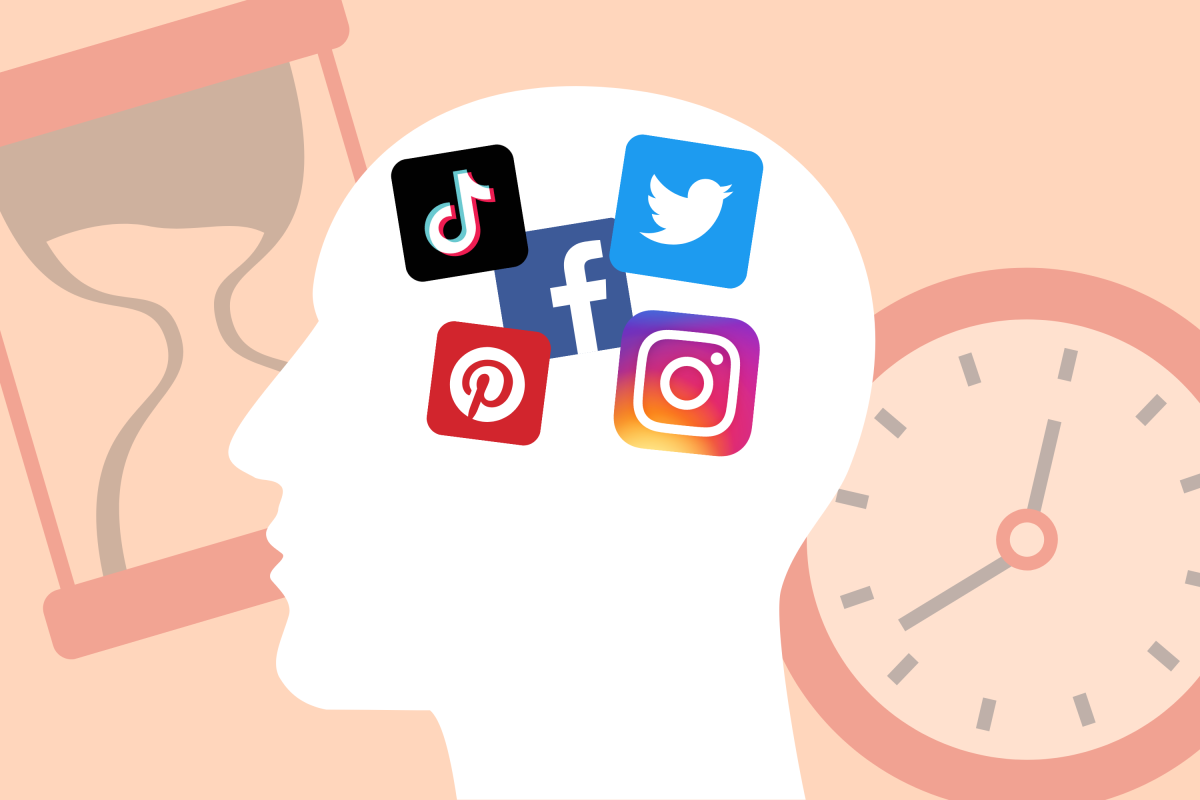Like many students at St. Joe’s, Saraiah Ferguson ’25 spends an estimated 10 hours per week scrolling through social media apps such as Snapchat, Instagram, YouTube and TikTok, checking these accounts throughout the day as part of her daily routine.
The World Health Organization has characterized excessive internet use as a growing problem. The Pew Research Center reported that 71% of 18-to-29-year-olds report using Instagram, 65% are on Snapchat and more than half use TikTok.
“Everyone has their different social media channels that they’re on all the time,” said Michael Kates, Ph.D., assistant professor of philosophy. “It’s sort of like a telephone now and a TV. It’s part of our overall ecosystem.”
Frequent usage is not uncommon among social media users due to potential social media addiction according to Vikram R. Bhargava, Ph.D., assistant professor of strategic management & public policy at George Washington University School of Business, who recently delivered a lecture titled “Ethics of the Attention Economy: Facebook and the Problem of Social Media Addiction” at St. Joe’s on Oct. 29.
According to Bhargava, social media platforms are tailored to individual users to make them more addicting, and the more an individual uses a platform, the higher risk there is for addiction to develop.
“With anything that’s addictive, like coffee or cigarettes, the fact that you use a cigarette once doesn’t mean that you’re going to become addicted to cigarettes, but you expose yourself to a heightened risk of [addiction],” Bhargava said.
“Social media has become more than just a media platform, but a primary mode of communication for many users. Ferguson said without social media, she would not talk to as many people as she does now.
“I wouldn’t talk to some of the people that I do from time to time,” Ferguson said. “A lot of us don’t have each other’s numbers because we’re not close enough.”
Jake Singleton ’25 said he used to be an avid social media user until he examined how it was affecting his mental health. While he does not believe he was addicted, he feels as though he was compelled toward using social media.
“I would say before checking social media, I’d probably feel bored because 90% of the time, that’s the reason I checked,” Singleton said.
During the time he was active on social media, Singleton said his physical communication with people was limited as he spent more time on social media.
“The more social media apps I would have, the more energy I would dedicate to things that I only had to do with that app,” Singleton said. “I would spend more time online than physically interacting with my family, taking care of my dog, exercising, or even just taking care of myself properly,” Singleton said.
Singleton said he recently started deleting his social media platforms, as he felt the things that were on his timeline were not helpful to him.
“I didn’t feel it was healthy for me to keep exposing myself to that much toxicity,” Singleton said. “It wasn’t healthy to have that much anger and resentment towards problems that I don’t face in my daily life when I already have enough.”
Despite the challenges with social media, Bhargava believes that users are more aware of the effects that social media has on their mental health than people realize.
“I think young people are mischaracterized as being oblivious to the ways in which social media is affecting them,” Bhargava said. “I think that they’re quite sensitive and quite aware of the ways in which social media is affecting their general mental health and their social relations.”
Since deleting several social media platforms, Singleton has seen a positive effect both mentally and physically.
“Now that I’ve weighed on it, I feel like I have a lot more freedom to spend my time doing things that are actually productive, doing physical things that will benefit my mental health and more interacting with people face to face,” Singleton said.















































